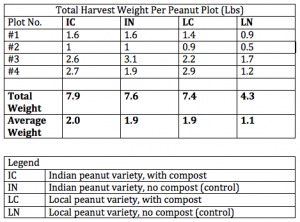A Successful Peanut Harvest in Cap-Haitien
Some great news from the SOIL farm in Cap-Haitien: a recent harvest from the experimental peanut gardens yielded very promising results. SOIL compost nearly doubled the yield (based on weight in lbs.) for a local variety of peanut. We planted four large plots in our experimental garden, each containing four "treatments" - an Indian peanut variety with and without compost, and a local variety with and without compost. Though the compost seemed to have only marginal effects on the Indian variety, it produced impressive results in the local variety, creating an average yield between the 4 plots of 1.1 lbs without compost and 1.9 lbs with compost. We believe that these results hold a great deal of potential for local Haitian farmers, and are excited to share our findings.
The chart below details our findings for each of the four plots, broken down by the different "treatments." All figures represent weight in pounds (lbs).

To further explore these findings and continue our research, we are expanding our peanut studies to cover two large plots of land, one that was once designated for commercial development, and another that is being worked by a group of agronomy students from a local university for academic research. On the commercial plot we will be replicating the previous experiment on a larger scale and with variations in the amount of compost applied, and in the academic research plot we will experiment with urine application as well.
We hope that this research can quantify the potential for EcoSan generated compost to boost agricultural yield for a local staple crop, and that our experimental gardens can provide an example for local farmers, officials, and community members, demonstrating the value of ecological sanitation.
Additionally, crushed peanut shells play an integral role in the balance and effectiveness of our sweet-smelling cover material, Bonzodè, so we are able to transform the discarded shells into a valuable resource, as well!
[gallery exclude="2885, 2886"]
If you’re nuts about SOIL, stay tuned for more news from our peanut plots over the next few months.